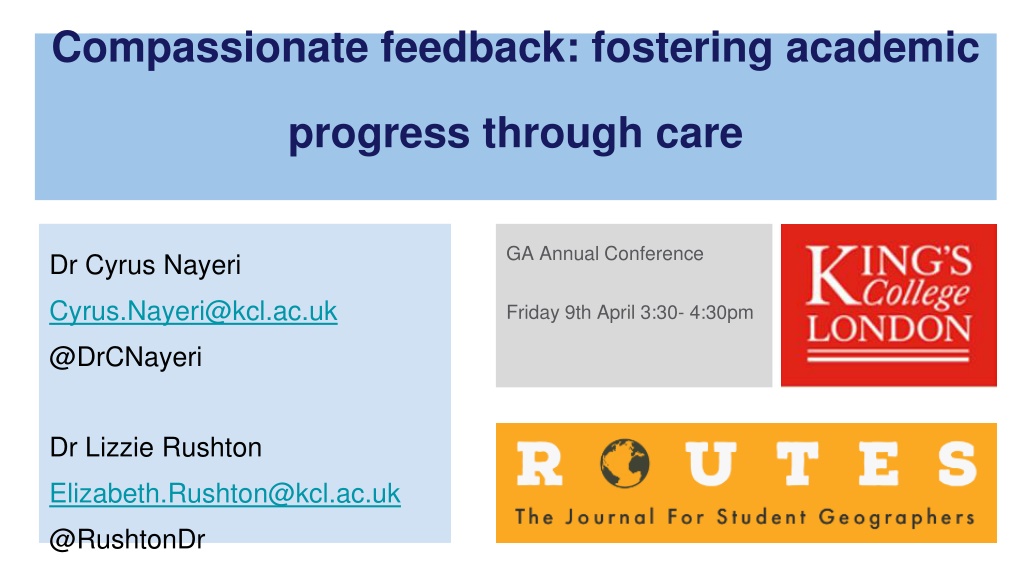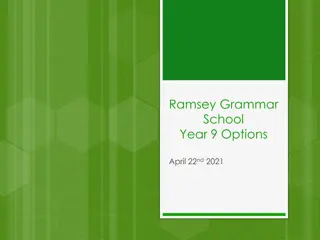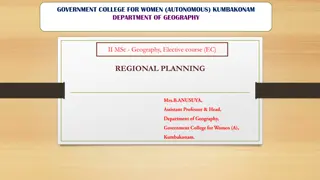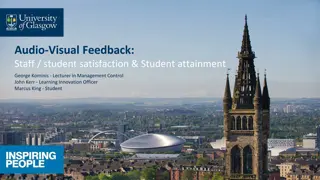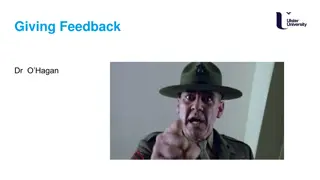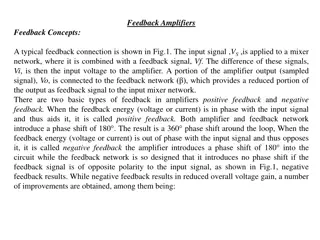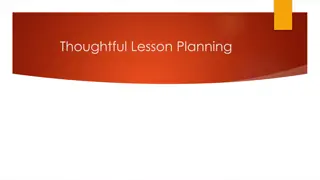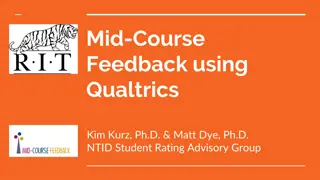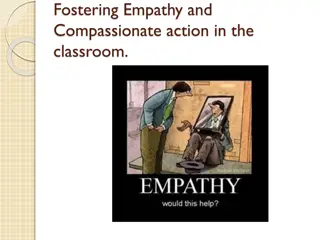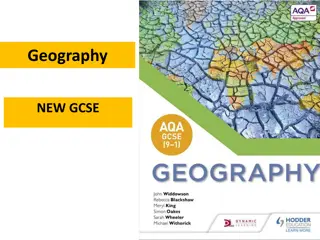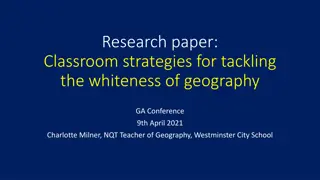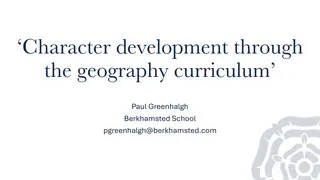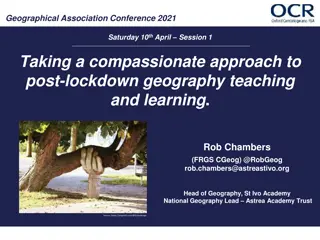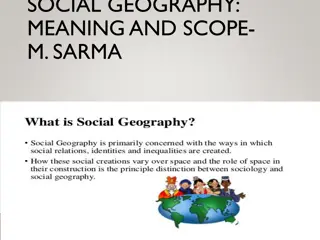Enhancing Student Learning Through Compassionate Feedback in Geography Education
Feedback in geography education has traditionally been viewed as a technical exercise, but there is a growing emphasis on incorporating emotions and fostering a supportive learning culture. Compassionate feedback, personalized and friendly, is essential for motivating students and encouraging improvement. Research highlights the importance of student experiences with feedback and the benefits of a caring approach in academic progress.
Download Presentation

Please find below an Image/Link to download the presentation.
The content on the website is provided AS IS for your information and personal use only. It may not be sold, licensed, or shared on other websites without obtaining consent from the author. Download presentation by click this link. If you encounter any issues during the download, it is possible that the publisher has removed the file from their server.
E N D
Presentation Transcript
Compassionate feedback: fostering academic progress through care GA Annual Conference Dr Cyrus Nayeri Cyrus.Nayeri@kcl.ac.uk Friday 9th April 3:30- 4:30pm @DrCNayeri Dr Lizzie Rushton Elizabeth.Rushton@kcl.ac.uk @RushtonDr
How has feedback in geography previously been approached?
Feedback is generally viewed as a technical exercise with relatively little attention paid to the importance of emotions/ affects between teachers and students as a technical skill in itself the ultimate user of assessment information is the learner and the culture needed in the classroom to support and encourage the learner is one of success, backed by a belief that all can achieve. One method of finding the correct balance and tone to encourage redrafting and further improvement is two stars and a wish . (Weeden, 2005: 163)
To encourage student motivation and redrafting, feedback has focused on the idea of praise as part of a feedback sequence (praise, improvement, encouragement) Reflections: How does this feedback feel when it is received by the student? Does the feedback feel like a criticism? Does it actually feel like a well done or encouragement? Source: Rooney (2006)
What kinds of feedback actually motivate students?
The study - We conducted seven in-depth interviews with undergraduate geography students to discuss their experiences of feedback Students sampled were chosen as they successfully published their work in Routes and were able to reflect on both the experience of Routes and compare to their experiences of receiving feedback more broadly at university/ school The interviews spotlight several themes that are likely to be applicable to both undergraduate and sixth form feedback - - L
5 initial components of compassionate feedback Compassionate feedback is Personal, specific, friendly (Author A) and makes students feel like they are not treated like a number (Author B) involves the care for the individual- concerned about their interests, not using templates, shows a level of investment through detail and time spent shows and demonstrates rather than critiques minimises the possible jarring nature of receiving feedback/ stress and judgement appreciates that students want different things out of feedback (affirmation/ suggestions/ encouragement) L
I think it is the fact the marker has put a lot of effort into improving your essay, and that is clear because of the specificity of the comments and the guidance, they will go through every point and once they break it down like that, rather than having one bit of feedback, one comment that sums up the whole thing (Author C) L
It was quite encouraging because one of them said, there is clearly a future in academia and I hadnt ever really thought about doing something further, bar my degree, erm, and it made me think, oh, maybe I could look into the topic more and they were like you clearly have a passion for the subject and that made me think, it was really a chance for more like self-reflection whereas university it is more did I meet the grade? (Author D) L
It was just a list of what could be included and didnt include any feedback on what was good and that was quite demoralising (Author A) L
What is Routes? A pioneering new, peer-reviewed e-journal for sixth form and undergraduate geography students. Launched September 2020 - 3 issues per year Free to read, submit and participate Independent- made possible by the expertise and time of the geographical community L
Student work improves significantly through the review process
Original submission Title is taken form A level exam-style question Written as quite a comprehensive answer with some thoughtful use of geographical concepts
Student receives 2 sets of peer reviewer feedback and makes corrections Starts to become less A level focused. Student rethinks the question in light of their own interests Article develops around COVID-19 and Didsbury
We develop students skills of critical reflection on their own work by asking them to outline the changes they have made when they resubmit following corrections
2nd draft- author begins to challenge geographical concepts from the course (exogenous) Once accepted, the article is then developed to its full potential through interactions with the Editor-in-Chief
3rd draft- piece becomes more focused, selecting the key concepts to tell the story
4th draft (final)- student is introduced to and experiments with new concepts from university geography (atmospheres) and develops the ethnographic nature of their writing (including photos and descriptions)
Some examples of giving compassionate feedback: Routes
Excerpts of feedback given to 6th formers and undergraduates 1) This is a very interesting piece of work with a lot of potential. There are some wonderful references here and your writing is really coming along. I see this essay really shining if it were to be changed to a study of a particular country and showed for example how the dependency theory model or world systems theory model helps to account for levels in development in that country. 1) I am really pleased to see the amount of effort and time you have spent making these changes and your work shows a marked improvement. I hope you found the process of reflecting on the feedback and altering your work a valuable one . You should be very proud of your submission and how it has developed through the different drafts. It is a really interesting read and a quality piece of scholarship . If you are interested in building on this work further e.g. for a dissertation , your COVID example reminds me of work on the moral economy (Polanyi 1944 and others) This might be something you want to explore. You would really like the ideas of .... 1)
Students tell us how valuable the style of feedback we offer is to motivating their work Once again, I would like to thank you for the secondary amendments to my essay. During this peer review process, I have really felt my academic writing improve dramatically. I have completed the suggestions and I hope that my writing is of a good enough academic level. I know at times my writing is too journalistic or opinion based, but I hope that I have managed to create a better academic piece. I have thoroughly reconsidered some of my wording where it sounds too journalistic, for example where I use words that introduce more subjectivity. I also tried to increase the depth of my evaluation. I have tried to make it more scientific by reiterating the uncertainty of the general outcomes mentioned in my essay. I have also re-familiarised myself with the proper referencing format and hope I have managed to do it properly this time. I also added more sources to reinforce the validity of my essay, along with a couple more examples to expand the depth of my points. With my knowledge from this peer review process, I hope to apply this to one of my older essays and adapt it so it is sufficient for another submission. If there are any other edits I should make, I am more than happy to do them! Motivation to draft and redraft is enabled through the warm, personal connections we have forged through the feedback process 6th Form student
Teachers tell us the value of our feedback to making lasting improvement in student attainment it [the feedback and publication process] has really lifted their level of attainment and awareness of academic writing e.g. X now always includes references when submitting typed assignments. Head of Geography
Summary 1) We have outlined that compassionate feedback is way of giving feedback that recognises the importance of emotions/ affects between teachers and students as a technical skill 2) We have outlined 5 principles that underpin compassionate feedback 3) We have showed how applying these principles through Routes has led to exceptional progress by 6th form and undergraduate geographers through encouraging motivation 4) Compassionate feedback works because students feel invested in, supported and treated as an individual- not judged.
Provocations for discussion 1) How do you see compassionate feedback working in your school? How might you implement some of these ideas?
Provocations for discussion 2) What are some of the challenges with implementing compassionate feedback in schools?
Provocations for discussion 3) Does compassionate feedback require different skills from teachers? If so, how can these be acquired?
References Rooney, R. (2006). Effective feedback as a focus for CPD with a developing geography department. Teaching Geography, 31, 84 86. Weeden, P. (2005). Feedback in the Geography Classroom: Developing the use of assessment for learning. Teaching Geography, 30, 161 163.
